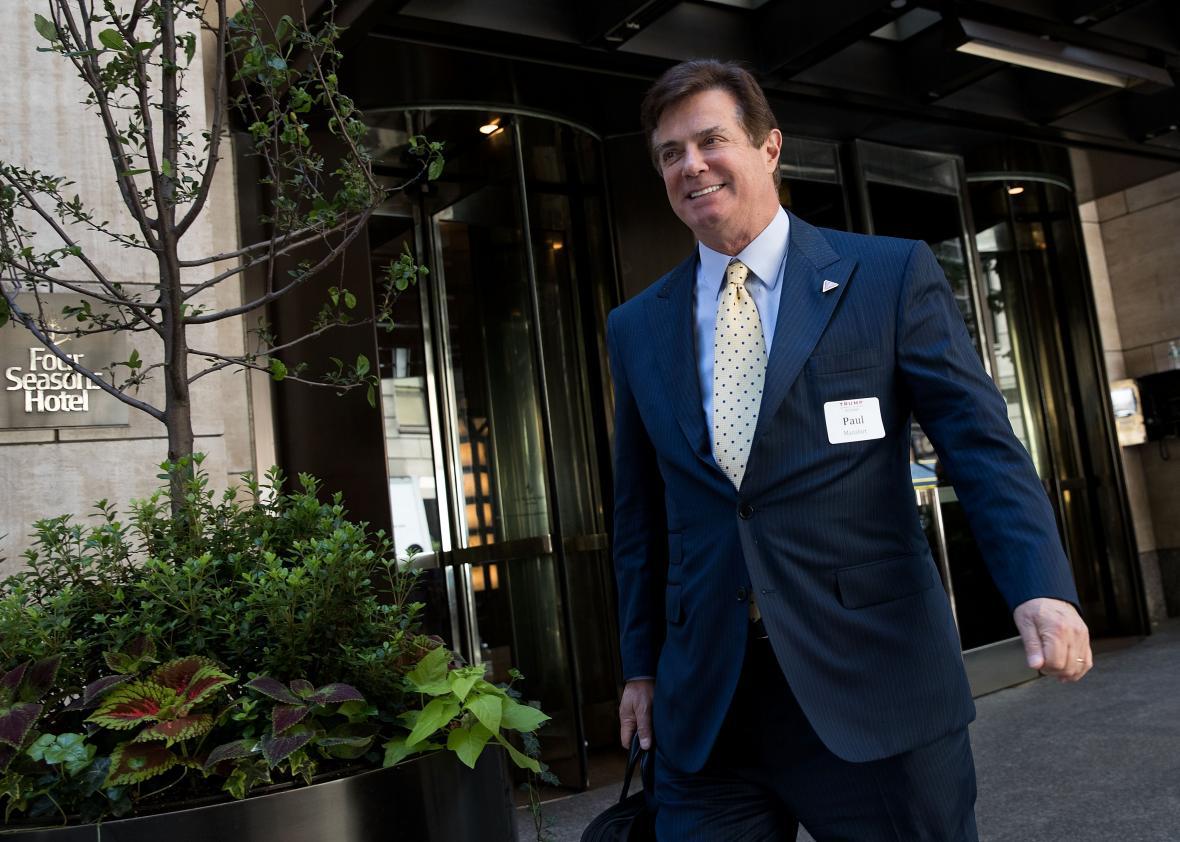Special counsel Robert Mueller on Monday charged former Trump campaign chairman Paul Manafort and his former business associate Rick Gates with a laundry list of crimes related to secret work done on behalf of a pro-Russian Ukrainian political party. That list includes failing to register as lobbying agents of a foreign government, laundering millions of dollars in payments from those lobbying efforts through unreported offshore accounts, using that money in a property loan scheme to defraud banks, and lying to federal investigators in attempt to cover up the schemes.
The charges are the first in special counsel Robert Mueller’s probe of Russia’s efforts to influence the 2016 election. Most of the crimes took place long before Manafort was working for Trump. While Manafort was head of Trump’s campaign, though, Russia took part in an extensive effort to get Trump elected that included hacking the Democratic National Committee. Before that hack, Donald Trump Jr. arranged for Manafort and Trump son-in-law Jared Kushner to meet with an attorney who was offering help directly from Russia. (Trump Jr. famously responded to the offer of dirt on Clinton by saying, “[I]f it’s what you say I love it especially later in the summer.”) Manafort resigned from the campaign in mid-August 2016 after news reports about Manafort’s alleged lobbying efforts and his attempts to conceal them.
The indictment is a painstaking catalog of Manafort’s alleged connection to and support of Russian interests prior to the Trump campaign, how he allegedly profited handsomely off them and went to great lengths to cover them up, and how he allegedly used that wealth to further defraud banking institutions to the tune of millions of more dollars. Manafort is said to have laundered at least $18 million, while Gates transferred $3 million from offshore accounts to others he controlled. “In total, more than $75 [million] flowed through the offshore accounts,” according to the indictment.
Here are some of the highlights alleged in the indictment:
- Manafort and Gates “generated tens of millions of dollars in income” from their work as unregistered agents supporting former Ukrainian President Viktor Yanukovych between at least 2006 and 2015. (The pro-Russian Yanukovych was ousted in 2014, which ultimately led to Russia’s invasion of Ukraine.) The pair helped set up a dummy “center” that was headed by Yanukovych and his political party. It then set up a pair of ostensibly separate dummy companies to do lobbying work on behalf of the center. They told investigators that they were mere facilitators in all of this, but Mueller’s indictment says that they engaged in weekly calls and frequent emails with the companies to give them specific directions on lobbying work, sought detailed reports on the lobbying effort, communicated directly with U.S. officials in connection with the work, and “paid the firms over $2 million from offshore accounts they controlled.” A raid of Manafort’s home this past July uncovered numerous documents related to this lobbying effort.
- Between 2006 and 2016, the pair “laundered money through scores of United States and foreign partnerships, and bank accounts.” These included shell companies and offshore accounts in Cyprus, Grenadines, and the Seychelles.
- When confronted by federal investigators with their failure to register as foreign agents, the pair “responded with a series of false and misleading statements.” The pair is said to have falsely claimed to investigators the following: that their lobbying efforts did not include meetings or outreach in the U.S., that neither man had an agreement to provide lobbying services, that they did not connect Yanukovych’s party to the dummy company, that they did not conduct outreach to U.S. officials or media on behalf of Yanukovych’s party, and that they did not have any documentation that might relate to these apparent lobbying efforts.
- Manafort “used his hidden overseas wealth to enjoy a lavish lifestyle in the United States, without paying taxes on that income.” According to the indictment, that apparently included $934,350 spent at an antique rug store in Alexandria, millions of dollars in home improvements, $849,215 spent at a “men’s clothing store in New York,” $623,910 spent at an antique dealer in New York, $520,440 spent at a clothing store in Beverly Hills, $163,705 in “payments relating to three Range Rovers,” a $62,750 Mercedes Benz, a $47,000 Range Rover, and $20,000 in housekeeping.
- Manafort used the money from his offshore accounts to purchase real estate and take out mortgages on those properties allowing him “to have the benefits of liquid income without paying taxes on it.” This included a New York City condo in Soho that cost $2.85 million and a Brooklyn brownstone in the Carroll Gardens neighborhood that cost $3 million. He then borrowed $5 million against one of his properties ostensibly for construction but used the loan to pay off a separate mortgage and put a down payment on another property in California. In order to acquire a loan, he instructed his daughter and son-in-law to lie to a bank and say that they were living in the property as a secondary home. The property was actually a rental property. Gates helped facilitate this effort.
- Manafort lied on his taxes about all of this income.
Again, the indictment demonstrates how meticulously Mueller has worked to prove that the man at the helm of Trump’s presidential campaign for much of 2016 profited enormously off extensive ties to Russian interests. It is the first shot fired in Mueller’s investigation, it is a heavy one, and it seems likely not to be the last.
